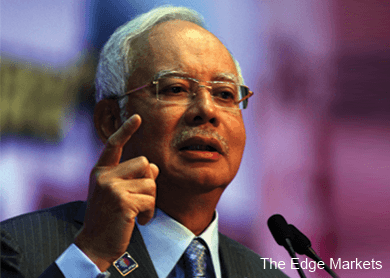
(May 19): Despite responding to critics in a blog post on Sunday, there is no guarantee that Prime Minister Datuk Seri Najib Razak would win back support from a divided public, analysts say.
Neither would it calm his more strident detractors in Umno, such as Tun Dr Mahathir Mohamad, who would likely continue his campaign to oust Najib from Umno.
Political observers said this trust deficit stemmed from the fact that Najib’s Barisan Nasional (BN) was re-elected despite winning only 47% of the popular vote in the 13th general election.
Such a polarised public does not provide the climate for objective discussions on policy issues, be it the cash handout programme under the 1Malaysia People’s Aid (BR1M) or the goods and services tax (GST).
For instance, Najib's justification for BR1M may have made economic sense compared with the blanket subsidies of his predecessors, but the explanation might still not satisfy his detractors.
“I think that for some of his critics, such as Tun Dr Mahathir Mohamad, it does not matter whether these issues can be answered,” said Ibrahim Suffian of independent polling outfit Merdeka Center.
“Dr Mahathir has already decided that he does not want Najib, so he will continue going after the prime minister,” Ibrahim told The Malaysian Insider.
Najib on Sunday took to his website NajibRazak.com to refute some of the key accusations made by his Dr Mahathir and other critics within Umno, such as former ministers Tun Daim Zainuddin and Tan Sri Zainuddin Maidin.
In the FAQ section of his blog, the Umno president listed 13 issues and claims that had been hurled against him and his administration.
These included the murder of Mongolian translator Altantuya Shaariibuu, use of government jets and claims that BN would lose the next general election.
Najib also responded to allegations surrounding debt-laden state investment firm 1Malaysia Development Bhd (1MDB), by imploring his critics to wait for the results of the auditor-general’s investigation.
Yesterday, however, Najib’s Facebook page was flooded by social media users unhappy with his explanations and who still demanded he resign.
“To be fair, he has practically answered every issue addressed to him,” said Umno Youth exco Ibdillah Ishak.
“And for issues such as 1MDB, we should wait for the outcome of the PAC (Public Accounts Committee) and auditor-general’s investigations before speculating further,” said Ibdillah.
The Umno Youth leader, however, said he was not yet able to gauge whether party members and the wider public were satisfied with Najib’s explanations.
Though Najib’s explanations were aimed at the public, there were parts of his post where he appeared to be speaking to critics from Umno.
For instance, on the claim he would lead BN to lose the next general election, Najib had said "if we are united, and stop the infighting, we will succeed" – a veiled reference to the rifts in Umno caused by Dr Mahathir.
Political scientist Associate Professor Mohammad Agus Yusoff, however, said the reaction on social media to Najib's explanation could not be taken as an accurate gauge of whether the wider public was satisfied.
This is since the Internet was dominated by ardent supporters of political parties and cyber-troopers – paid or unpaid party activists in the war on public perception, said Agus.
High-level politicians such as Najib attract a lot of attention from these two groups who will take the time to go online and bash or praise him regardless what he might have said.
Whether the real man on the street accepted Najib’s explanation, said Agus, depended on how consistent, clear and honest his answers were, and whether they matched the reality when government policies and promises were executed.
For instance, how Putrajaya dealt with the issue of GST for pre-paid mobile reloads was an example of how not to deal with a public criticism towards policy.
The root of the issue was that the public did not want pre-paid reloads to be taxed since the majority of users were low-income earners.
“But instead of dealing with that question, they announced that in the end, pre-paid usage would still be taxed. While consumers actually do not want the tax in the first place,” Agus told The Malaysian Insider.
Ibrahim said the explanations could help Najib in the medium term. Long term, however, would depend on how well he managed the economy and issues surrounding the GST.
“To begin with, less than half of the public already views the prime minister negatively,” said Ibrahim referring to the 47% share of votes BN received in the 13th general election.
This was worsened, he said, by an unpopular tax and the widely held view – fuelled by financial scandals such as 1MDB – that Najib’s administration was mismanaging public funds. For that, carefully tailored answers will not suffice. – The Malaysian Insider